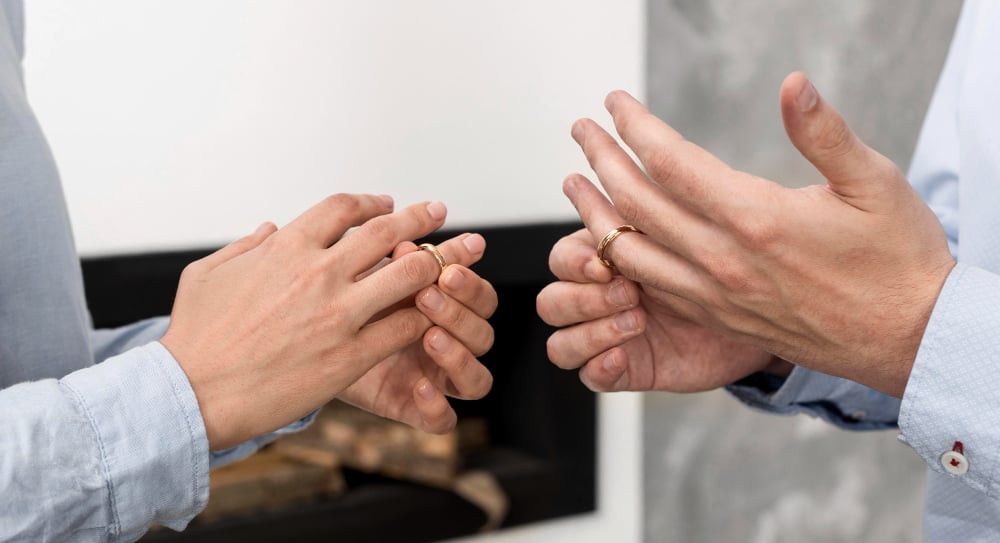Divorce in the Netherlands can put expats in a tricky and unknown territory. However, it’s good to know that you’re not alone — and that you have come to the right place.
The path to understanding the ins and outs of the Dutch divorce process might seem winding at first, but we’re here to guide you through each step.
From understanding the key principles of Dutch divorce laws to discussing residency requirements, the divorce proceedings, financial aspects, and alternatives, we’re tackling it all.
- Getting a divorce as an international in the Netherlands
- When can you divorce in the Netherlands?
- Mastering the divorce procedure in the Netherlands
- Navigating the (financial) aspects of divorce in the Netherlands
- Addressing child-related matters in a divorce in the Netherlands
- Exploring alternatives: divorce isn’t the only option in the Netherlands
- Finding help and support during your divorce in the Netherlands
- Important Dutch terms when getting a divorce in the Netherlands
- Divorce in the Netherlands: Frequently asked questions
Getting a divorce as an international in the Netherlands

First things first, let us tell you that the fact that you are getting a divorce as an international should have no effect on your divorce proceedings.
As long as the Dutch courts have jurisdiction (more on this below), you will have the same rights as any Dutch citizen.
I want a professional, now what?
Now it’s time to find experts in divorce in the Netherlands who know the complexities of an international divorce. GMW lawyers are here to specifically fill this role. They know Dutch law — and they also know how it affects internationals. Reach out to them for expert guidance on Dutch divorces.
Yes, the divorce could affect your residency permit (more on this below). However, the bottom line is that you should still receive the same treatment as any Dutchie while going through divorce proceedings.
Unpacking no-fault divorce in the Netherlands
You can breathe a sigh of relief knowing that a divorce in the Netherlands doesn’t play the blame game.
That’s because Dutch law considers an irretrievable breakdown of the marriage as grounds for divorce.
Basically, if it’s clear that the relationship isn’t working out, a divorce can be granted. There’s no need to throw accusations at one another and air out dirty laundry: simply say, “It’s not working,” and the Dutch law will take your word for it.
It’s a more humane approach that acknowledges the complexities of relationships, making the Netherlands a good country to untie the knot.
Different ways of divorcing in the Netherlands

When you and/or your partner opt for a divorce, you need to decide together how you should approach it. Can the two of you tackle this breakdown of the marriage side by side? Or will you be coming at it from different angles?
Your answer will determine which route to divorce you will take.
- Perhaps the most favourable option is a joint divorce. In a joint divorce, you both share an attorney or (attorney)-mediator. They will help the two of you reach an agreement together.
- If approaching the divorce together isn’t an option, you and your partner can opt for separate attorneys. In consultation with the two of you, your attorneys will try to come to a mutual agreement about the specifics of the divorce.
- If an agreement between your two attorneys isn’t possible from across the table, then it’s time to take the divorce to court. The court will then decide how the divorce should be carried out.
Good to know: In the Netherlands, it is compulsory to either have a shared attorney or separate attorneys when your divorce is taken to the Dutch court.
Embracing mediation for a smooth divorce in the Netherlands
M is for marriage — but when it comes to your divorce, it’s also for mediation.
The emotions involved in getting a divorce can be messy, and even when you have the best intentions, it can be hard for negotiations not to get heated.
This is why you should opt to get a mediator involved. This process involves a neutral third party — the mediator — who helps you and your partner find a mutually beneficial resolution to your issues.
It’s a way to keep the conversation civil, reduce conflict, and lay the groundwork for a positive post-divorce relationship (which is especially crucial when kids are involved.)
When can you divorce in the Netherlands?

With the above in mind, let’s answer the simple question: when can you get a divorce in the Netherlands as an international?
In short, a link with the Netherlands is needed in order for the Dutch court to have jurisdiction.
This link with the Netherlands could be, for example, that you and/or your spouse have Dutch nationality or that you and/or your spouse live in the Netherlands.
Having lived in the Netherlands in the past or merely being married in the Netherlands with no other link to the Netherlands is insufficient for the Dutch court to have jurisdiction over the divorce.
In need of a legal expert? GMW lawyers are experts in family and divorce law. They’ll navigate you through the Dutch divorce process with care, attention, and expert advice for your personal situation. Find out more.
If you are legally married
This one is quite self-explanatory, but yes, you have to be legally married in order to get a divorce.
It doesn’t count if you dressed your golden retriever as a wedding officiant, gave each other a kiss, and then all danced around the garden.
Unless you’ve signed all the papers and dotted all the i’s, you’re not legally married, and a divorce cannot be carried out.
Mastering the divorce procedure in the Netherlands

It doesn’t matter if this is your first divorce or your seventh. No matter what your experience, you’re going to need the experts involved in order to tackle divorce in the Netherlands — but don’t stress, it’s relatively simple.
Filing for divorce in the Netherlands
First things first, you’ve got to officially file the paperwork. Getting started with a divorce in the Netherlands might seem intimidating, but fear not! Your attorney will submit a petition to the District Court on your behalf.
If both parties are on the same page, a joint application is highly recommended as it simplifies the procedure.
Mediation and settlement
Once you have both agreed to a joint application (or perhaps you haven’t), it’s time to call on your mediator.
The mediation process can be an invaluable tool during your divorce in the Netherlands. It’s a chance to discuss and resolve issues privately, reducing potential conflicts and fostering a collaborative environment.
Through mediation, you and your partner can tackle the stickier stuff involved in a separation.
Covering everything from asset division to child custody, a mediator can help the two of you reach a settlement agreement in a less confrontational setting.
Navigating the (financial) aspects of divorce in the Netherlands

If there’s one huge element in divorce, it’s the (financial) issues that come along with it.
After years of marriage, who decides who gets that duck-shaped wine holder? Those porcelain cows? Or that broken-down bike?
More importantly, is there alimony involved? What happens with the care arrangements for the children? And do you have to divide the pensions that you accrued?
Before we look at this in more detail, it is good to know that every international divorce case is different. When you divorce in the Netherlands, the Dutch court does not apply Dutch law automatically.
Instead, the (international, European and/or national) treaties and laws determine what law the Dutch court needs to apply.
Did you live outside the Netherlands at the time of your marriage? For example, in Spain? The division of assets and debts may then have to take place under Spanish law in the Dutch courts.
An international divorce can get complicated, but the good news is that you do not have to find this out on your own. An international divorce attorney or mediator can help you with this.
GMW lawyers are experts in family and divorce law. They’ll guide you through the Dutch divorce process with care and can offer expert advice for your personal situation. Find out more.
Property division in a divorce in the Netherlands
When Dutch law applies to the property division, you automatically enter into what is known as a ‘limited community of property system’ (gemeenschap van goederen), unless you arranged a prenuptial agreement before or during the marriage.
However, how the community of property is applied may still vary depending on factors such as when you were married.
Alimony in the Netherlands: what you need to know
Much like property division, when it comes to alimony in the Netherlands, there are a number of variables that will determine how it is applied in your personal situation.
In the case where Dutch law is applicable, the court will examine whether alimony is needed. If it is, which type of alimony should it be? For example, partner alimony and/or child alimony.
Whether or not you receive these is determined by aspects such as your child’s age.
Pensions and retirement funds: planning for the future post-divorce
If the question of your pension does fall under Dutch jurisdiction and Dutch law is applicable, then something called pensioenverevening is applied.
This translates to pension equalisation and essentially means that any pension built up during the marriage will be split into two equal parts.
However, when it comes to international couples, there can be some complications.
Waarom? Because you may have accrued your pension through an international company — and foreign pension funds do not always recognise the Dutch court’s rulings.
Addressing child-related matters in a divorce in the Netherlands

More important than the assets are any children involved. In the Netherlands, children’s best interests are paramount in any divorce proceeding. Let’s look into this in more detail.
If your situation falls under Dutch jurisdiction and Dutch law, this is how the child-related matters of your divorce will be handled:
Parenting plan: a roadmap for your kids’ future
Since 2009, the Dutch divorce process must also include the submission of a parenting plan (ouderschapsplan) for those with children.
Your parenting plan will outline how you and your ex-partner will handle key decisions about your child’s upbringing, such as education, healthcare, and other important areas.
It’s a way to ensure your children continue to receive love and support from both parents without putting them in the middle of future disagreements.
Parental authority when getting a divorce in the Netherlands
Speaking of both parents, the Dutch courts often favour shared parental authority.
This means that even after divorce, both parents are responsible for matters involving the child, such as education and the managing of the child’s assets.
When parents divorce, they can make a contact arrangement as to when the child spends time with one parent or the other.
Child support in the Netherlands: ensuring the well-being of the children
In the Netherlands, child support, or child maintenance (kinderalimentatie), as the Dutch call it, is determined using a specific formula that, among other things, takes into consideration the child’s age, the contact arrangement, the parent’s income, and the cost of care.
It may also take into account any exceptional costs, such as the costs of enrollment in an international school. However, this is not guaranteed.
It’s designed to cover all the child’s basic needs, ensuring they can continue to live a life as uninterrupted as possible.
Child support is paid until the child reaches the age of 21.
If a parent fails to pay? Well, then the Landelijk Bureau Inning Onderhoudsbijdragen (National Maintenance Collection Agency) will be sent to collect — so no parent is left alone to tackle the financial burden.
Exploring alternatives: divorce isn’t the only option in the Netherlands

While you and your partner may be considering divorce, you should know it’s not the only option available. In the Netherlands, there are alternatives.
Considering legal separation as an alternative to divorce in the Netherlands
If you’re unsure about divorce, legal separation might be an option worth exploring.
A separation offers a chance to have some space, which can sometimes bring clarity.
It’s also a good alternative if you can’t divorce because of your religion.
However, it’s worth noting that if you opt for a legal separation, you’re still going to have to do some bureaucratic heavy lifting.
In the Netherlands, a legal separation requires that you settle all the same topics you would encounter when getting a divorce.
Note: While legal separation is certainly an option, it’s almost non-existent in the Netherlands.
Opting for dissolution of marriage in the Netherlands
After a three-year separation, dissolution of marriage can be a gentler way to end your relationship in the Netherlands. It’s like the quiet fade-out at the end of a song rather than an abrupt stop.
Finding help and support during your divorce in the Netherlands

Regardless of how fair or simple a divorce process is, it’s rarely an easy time in someone’s life.
For that reason, you should reach out for guidance, support and help from both your family and the experts who can make the transition run as smoothly as possible.
The value of professional guidance during a divorce in the Netherlands
Don’t hesitate to seek professional help. Family law attorneys experienced in Dutch divorce law can be invaluable allies, ensuring your interests are protected and that you understand the process every step of the way.
READ MORE | Everything you need to know about mediators in the Netherlands
Navigating a divorce in the Netherlands can seem daunting, but keep in mind that you’ve got the tools, the resources, and the strength to get through this.
Important Dutch terms when getting a divorce in the Netherlands
Navigating a divorce is enough stress in itself. Add to that the issue of a foreign language, and you can be left feeling overwhelmed.
Don’t fret, it can be done. Here are a few Dutch terms to understand while going through divorce proceedings.
| Dutch 🇳🇱 | English 🇬🇧 |
|---|---|
| Scheiding | Divorce |
| Bemiddeling | Mediation |
| Advocaat | Attorney |
| Afscheiding | Separation |
| Rechtbank | Court |
| Alimentatie | Alimony |
| Echtscheidingsrecht | Divorce law |
| Gemeenschap van goederen | Community of property |
| Ouderschapsplan | Parenting plan |
| Kinderalimentatie | Child support |
| Middelaar | Mediator |
| Partneralimentatie | Partner alimony |
| Pensioen | Pension |
| Huwelijkse voorwaarden | Prenuptial agreement |
Have gone through a divorce in the Netherlands? Tell us about your experience in the comments below.
Divorce in the Netherlands: Frequently asked questions
How long does it take to get a divorce in the Netherlands?
The duration of a divorce in the Netherlands varies depending on the complexity of the case.
Generally, an uncontested divorce takes around three to six months, while a contested divorce may take more than a year due to legal procedures and negotiations.
How much does a divorce cost in the Netherlands?
The cost of a divorce in the Netherlands varies depending on factors like legal assistance, court fees, and potential additional expenses.
Consulting with an attorney can help you understand the specific costs involved in your situation.
Good to know! In the Netherlands, you can apply for legal aid if you are not financially able to fund divorce proceedings.
What is the divorce law in the Netherlands?
The divorce law in the Netherlands follows a “no-fault” principle, where neither party needs to prove fault or wrongdoing.
The law focuses on the irretrievable breakdown of the marriage. It promotes mediation and encourages divorcing couples to reach agreements on matters like property division and child custody through negotiation.
How do I get a divorce in the Netherlands?
To initiate a divorce in the Netherlands, you need to file a divorce petition at the district court (rechtbank).
The process involves submitting necessary documents, such as a marriage certificate and a settlement agreement if you’ve reached one. It’s advisable to seek legal advice to ensure a smooth procedure.
How can I stay in the Netherlands after a divorce?
If you are a non-EU citizen and your residence in the Netherlands was dependent on your spouse’s visa, a divorce may affect your residency status.
You should consult with an immigration lawyer to explore options like applying for an independent residence permit based on work, study, or other grounds to stay in the country legally.
How does child custody work in the Netherlands?
In the Netherlands, child custody arrangements prioritise the child’s best interests. The standard practice is joint custody, where both parents share equal responsibility for the child’s upbringing.
However, if joint custody is not feasible or in the child’s best interest, one parent may be granted sole custody.
How does alimony work in the Netherlands?
In the Netherlands, alimony or spousal support is typically awarded when one spouse lacks sufficient income to support their living expenses.
The amount of alimony is determined on a case-by-case basis, considering factors such as age, income and learning capacity. Both partners can agree on the amount, or in the absence of an agreement, a court will decide.
For expats facing a divorce in the Netherlands, it’s crucial to understand these financial obligations and perhaps consult with a family law attorney to navigate this aspect.
Dear Mrs Brown, I’d like to thank you for the broadly explanatory article about divorce. Currently I live abroad of The Netherlands, it has been difficult to find information about the legal aid you mentioned in your article. Could you please inform me where I can find that information?
Kind regards
Go to zoekeenadvocaat.nl and then type in ‘scheiden’ in the box and then your zip code and then choose the second option (funded aid- addition).
I liked how you mentioned that a mediator can help you and your spouse come to an agreement during a divorce. My wife and I are struggling with our marriage and we are wondering how we are going to split up our kids if we get a divorce. I’ll be sure to tell her that we should talk to a mediator if we cannot decide.
Hello all, I like to file a divorce to my husband but we’re still living together but he has a Mental problem which make me so confused I’m suffering his bad behaviour and I don’t like to have a custody of my daughter might my daughter will be affected of his bad attitude.
He always smoke marijuana everyday and once he is stress he lose control which end up in a big drama situation he always like telling me or even showing us how he hurting himself then if I would say please don’t do that Infront of our daughter and then he will confronted of me that I only care our daughter not to him. He is really difficult person which killing me softly.
I hope someone could help me out. I’m living in the Netherlands for 5yrs and marriage in the Philippines.
Hello Rose hope someone had help u out x juridisch loket can inform for free